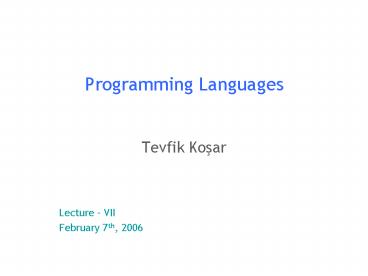Programming Languages PowerPoint PPT Presentation
Title: Programming Languages
1
Programming Languages
- Tevfik Kosar
Lecture - VII February 7th, 2006
2
Roadmap
- Names
- Scopes
- Binding
- Binding Times
- Static vs Dynamic Binding
- Object Lifetime Storage Management
3
Name, Scope, and Binding
- A name is exactly what you think it is
- Most names are identifiers
- Constants, variables, functions
- symbols (like '') can also be names
- A binding is an association between two things,
such as a name and the thing it names - The scope of a binding is the part of the program
(textually)in which the binding is active
4
Binding Time
- Binding Time is the point at which a binding is
created or, more generally, the point at which
any implementation decision is made - language design time
- program structure, control flow, possible types
- language implementation time
- Coupling of I/O to OS
- arithmetic overflow
- Maximum sizes of stack and heap
- Precision of the (number of bits) of fundamental
types
5
Binding Time
- Implementation decisions (continued )
- program writing time
- algorithms, names
- compile time
- Mapping of high level code to machine language
- link time
- layout of whole program in memory
- A name in one module refers to an object in
another module - load time
- OS loads the program into memory before running
- choice of physical addresses
6
Binding Time
- Implementation decisions (continued)
- run time
- value/variable bindings, sizes of strings
- subsumes
- program start-up time
- module entry time
- elaboration time (point at which a declaration is
first "seen") - procedure entry time
- block entry time
- statement execution time
7
Static vs Dynamic Binding
- The terms STATIC and DYNAMIC are generally used
to refer to things bound before run time and at
run time, respectively - static ? binding before run time
- "dynamic ? binding at run time
8
Binding
- In general, early binding times are associated
with greater efficiency - Later binding times are associated with greater
flexibility - Compiled languages tend to have early binding
times - Interpreted languages tend to have later binding
times
9
Object Lifetime
- Key events
- creation of objects
- creation of bindings
- references to variables (which use bindings)
- (temporary) deactivation of bindings
- reactivation of bindings
- destruction of bindings
- destruction of objects
10
Object Lifetime
- The period of time from creation to destruction
is called the LIFETIME of a binding - If object outlives binding it's garbage
- If binding outlives object it's a dangling
reference - The textual region of the program in which the
binding is active is its scope - In addition to talking about the scope of a
binding, we sometimes use the word scope as a
noun all by itself, without an indirect object
11
Storage Management
- Object lifetimes correspond to one of three
storage allocation mechanisms - Static
- absolute address retained throughout programs
execution - Stack
- Allocated deallocated in last-in, first-out
order, with subroutine calls and returns) - Heap
- Allocated and deallocated at arbitrary times.
- Stack and heap is used for dynamic allocation
12
Static Allocation
- Static allocation for
- Machine language translation of the source code
- Global variables
- Local but static variables
- explicit constants (including strings, sets, etc)
- scalars may be stored in the instructions

